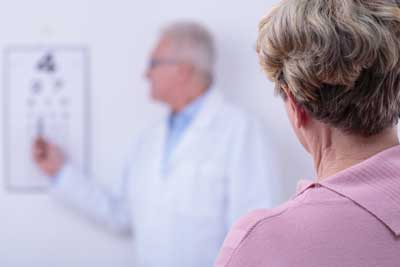More than half of Americans have had a cataract or cataract surgery by the age of 80, according to the National Eye Institute (NEI). However, just because cataracts are common among the elderly doesn't mean seniors have to live with poor vision and declines in quality of life. Here's what seniors and caregivers of seniors need to know to manage cataracts and promote optimal eye health.

Blurred vision? Cataracts may be the cause.
What Are Cataracts?The NEI defines cataracts as " a clouding of the lens in the eye that affects vision." Cataracts can occur in a single eye or in both. While they are usually related to aging, cataracts can also be brought on by other causes, including trauma, radiation, or following surgery for other eye problems.
In a normal, healthy eye, light passes through the eye lens and travels to the retina, where it is changed into nerve signals which are then passed along to the brain. If the lens is cloudy, the images received by the retina and transmitted to the brain are blurry. Over time, this can grow progressively worse and lead to partial or complete vision loss.
Is Your Aging Loved One at Risk for Cataracts?
While cataracts can come on in middle-age, the risk increases as we grow older. In addition to age, risk factors include diseases like diabetes, smoking and alcohol use, and prolonged exposure to sunlight. Healthy lifestyle changes can help reduce risk factors, as can a nutritious diet, including fruit, leafy green vegetables, and other antioxidant-rich foods.
Wondering whether your aging loved one might be suffering from cataracts? Cloudy or blurred vision is a common symptom. Additionally, seeing faded colors, glare, poor night vision, double vision, and frequent prescription changes to lens wear can indicate cataracts or an alternate eye problem.
The NEI recommends that seniors over the age of 60 have a comprehensive eye exam at least every two years. This may include a visual acuity test, dilated eye exam, and tonometry, in addition to any other tests deemed necessary by an eye care professional.
While conducting the exam the physician will look for signs and symptoms of other diseases and disorders of the eye, such as glaucoma and macular degeneration. In most cases, early diagnosis and treatment offer optimal outcomes when preserving sight and quality of life.
Treatments For Cataracts
In their earliest states, cataracts are treatable through a variety of non-invasive measures, including everything from brighter lighting and anti-glare sunglasses to magnifying lenses and new prescriptions.
If these treatments are ineffective, however, cataract surgery may be in order. In this common procedure, the faulty lens is removed and replaced with an artificial one. Approximately 10 million cataract surgeries are performed around the globe every year, and this number is only expected to rise.
Cataract surgery can mitigate vision loss and help seniors regain access to everyday activities, such as watching television, reading and driving. As with all surgeries, there are benefits and risks. Your loved one's physician can help you understand your options -- surgical and otherwise -- in order to make an educated decision.

Cataract surgery can be the key to restored vision...and quality of life.
A leading cause of vision loss and reversible blindness in seniors, cataracts don't have to affect your aging loved one's ability to enjoy a satisfying quality of life. By taking preventative measures, along with watching for early signs and symptoms of eye disease, you can do your part to help safeguard your aging loved one's vision and independence. For more information about cataracts, other age-related physiology changes, and a breadth and depth of other issues affecting seniors and caregivers for the elderly, visit mmLearn.
mmlearn.org offers a large library of free videos for caregivers of older adults, covering topics pertaining to senior care. Whether you are a healthcare professional or a family caregiver, if you are caring for an older adult we know that you will find mmlearn.org an essential learning and guidance tool for all of your caregiver training needs.

